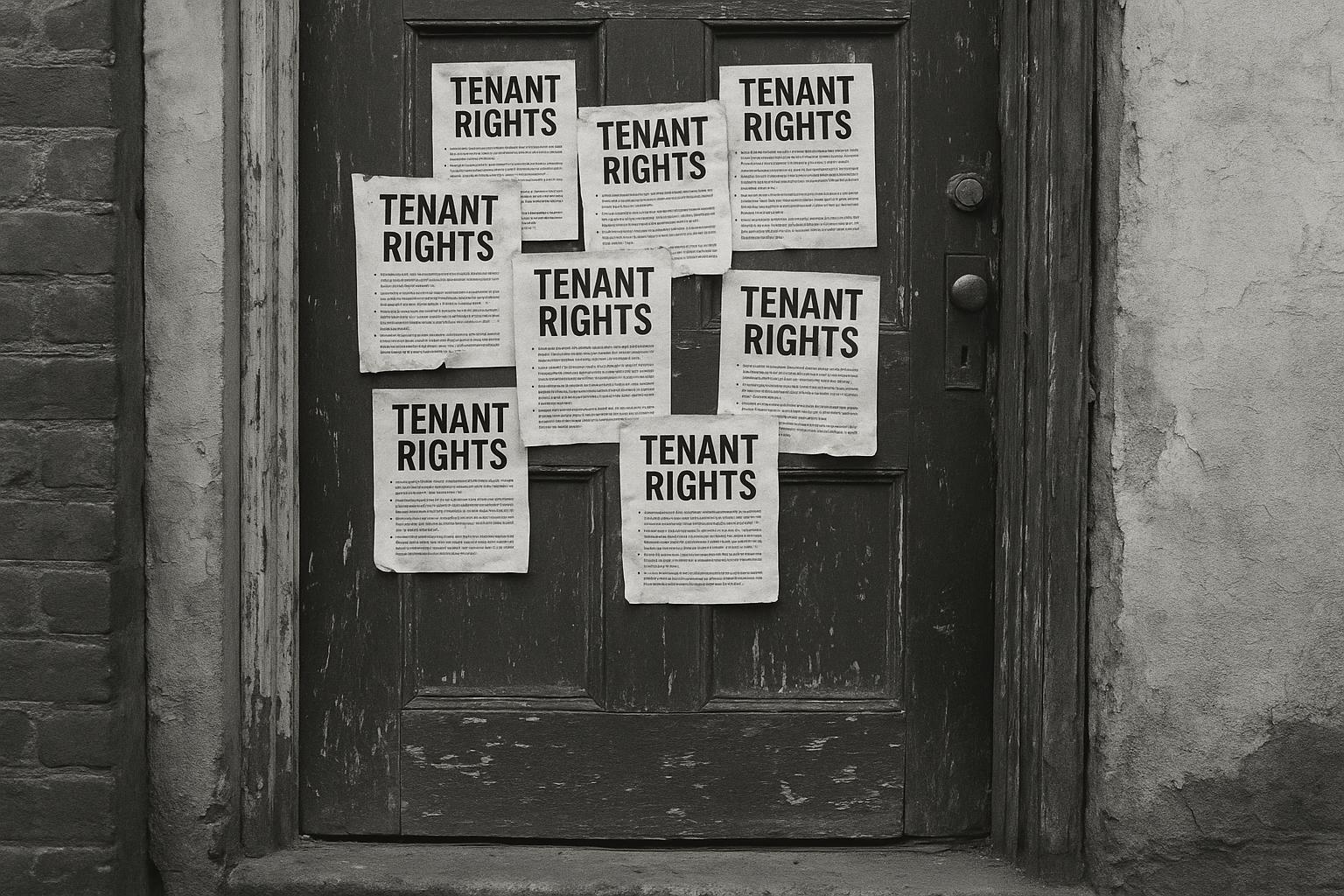The Renters’ Rights Bill promises to end no-fault evictions and improve tenant protections in England’s private rental market, but a controversial clause restricting re-letting following failed sales threatens to reduce rental property availability amid soaring rents and housing shortages.
Angela Rayner’s Renters’ Rights Bill, currently progressing through Parliament, introduces substantial reforms aimed at reshaping the private rental sector in England. Central to the bill is the abolition of Section 21 ‘no-fault’ evictions, which would prevent landlords from evicting tenants without providing a specific reason, thereby offering tenants enhanced security and protection against abrupt displacement. This shift is intended to recalibrate the long-imbalanced relationship between tenants and landlords, ensuring renters can better settle into their homes without the constant threat of sudden eviction.
However, some aspects of the proposed legislation have sparked considerable debate and concern among housing experts and landlord organisations. A particularly contentious element is a provision conditioning landlords who fail to sell their rental properties: if an attempt to sell falls through, these landlords would be prohibited from re-listing the property as a rental for a full year. This means they effectively forgo rental income during that period. Given that failed property sales are not uncommon, especially in a cooling market as recent data from Rightmove suggests, this provision risks incentivising landlords to withdraw properties from the rental market altogether. The National Residential Landlords Association (NRLA) warns this could exacerbate the already critical shortage of rental homes, with approximately half a million properties currently lying empty in England’s private rental sector.
Despite these concerns, Rayner’s overall strategy behind the bill aims to professionalise the rental market and encourage landlords to take a long-term approach rather than treating property rental as a short-term investment to be flipped quickly for profit. By banning no-fault evictions and enforcing a protected 12-month tenancy period where landlords cannot evict tenants for the purpose of selling, landlords are incentivised to maintain stable, long-term tenancies. This, in theory, mirrors rental models seen in many European countries, where tenants have greater tenure security and landlords benefit from more responsible stewardship of their properties.
Beyond evictions, the bill introduces a host of protections for renters. It mandates the introduction of a Decent Homes Standard for the private rented sector, ensuring properties meet basic conditions for health and safety. Landlords will be prohibited from refusing tenants on grounds of family status or benefit receipt, and tenants will gain the right to request pets without unreasonable refusal by landlords. The legislation also aims to prevent bidding wars among prospective tenants, a practice that can artificially inflate rents and reduce affordability. To support dispute resolution, a new ombudsman will be established to provide a more accessible and less adversarial forum than courts. Furthermore, the bill extends “Awaab’s Law” to the private rental sector, obliging landlords to promptly address serious hazards such as damp and mould following the case that brought the law’s namesake to public attention.
Reflecting a broader consensus, Labour’s reforms build on initiatives begun under Conservative chancellors such as George Osborne, who imposed tax changes that pushed smaller landlords out of the market, and Michael Gove, who advocated tenant protections. The current government, including Chancellor Rachel Reeves, has also sought to curb second-home ownership with extra stamp duty surcharges. This cross-party attention underscores the long-felt need to improve the quality and security of private renting while balancing reasonable expectations on landlords.
Yet the reform’s unintended consequences cannot be overlooked. In a market already characterised by high rents—Rightmove data shows record average advertised rents of £1,349 outside London and £2,698 within London—the risk is that tightening restrictions on landlords will further shrink available rental stock. Fewer properties mean intensified competition and rising prices, which ironically undermines the bill’s goal of improving conditions for tenants. The NRLA cautions that increasing the number of empty homes would deepen the supply-demand crisis, hurting precisely those the legislation intends to protect.
In summary, the Renters’ Rights Bill marks the most significant overhaul of the private rental sector in over three decades. Its provisions promise to enhance tenant protections and curb exploitative landlord practices. However, the proposal to restrict landlords from re-letting properties for a year following an unsuccessful sale may backfire by pressuring landlords out of the market and shrinking rental supply during an acute housing shortage. Balancing tenant security with healthy market functioning remains a complex challenge — one that demands careful consideration to avoid squeezing renters with unintended rent hikes. While well-meaning, some elements of the bill warrant further scrutiny and refinement to align good intentions with practical outcomes.
 Reference Map:
Reference Map:
- Paragraph 1 – [1], [3], [4], [7]
- Paragraph 2 – [1], [2], [5]
- Paragraph 3 – [1]
- Paragraph 4 – [1], [2], [3], [4], [5]
- Paragraph 5 – [1], [6]
- Paragraph 6 – [1]
- Paragraph 7 – [1], [2], [5]
Source: Noah Wire Services
- https://www.independent.co.uk/voices/housing-rental-reform-no-fault-evictions-landlords-tenants-b2773815.html – Please view link – unable to able to access data
- https://www.ft.com/content/edd32a50-e1ac-43ae-ad48-10ddfc178901 – The UK government has introduced a Renters’ Rights Bill aimed at transforming the private rental sector. Key provisions include abolishing no-fault evictions, standardising property maintenance to meet the Decent Homes Standard, and ensuring landlords cannot refuse tenants with children or those receiving benefits. Additionally, tenants will have the right to request pets, and landlords are prohibited from unreasonable refusals. This reform seeks to balance the interests of tenants and landlords, addressing issues like rent hikes and substandard living conditions. However, landlords express concerns about increased regulations and potential delays in removing problematic tenants.
- https://www.gov.uk/government/news/landmark-reforms-to-give-greater-security-for-11-million-renters – The UK government has announced landmark reforms to enhance security for renters, including the abolition of Section 21 ‘no-fault’ evictions. The Renters’ Rights Bill, introduced to Parliament, aims to ban these evictions for both new and existing tenancies, providing tenants with greater protection and the ability to challenge poor practices without fear of retaliatory eviction. The bill also extends Awaab’s Law into the private rented sector, ensuring landlords address serious hazards promptly, and introduces a Decent Homes Standard for private rentals.
- https://www.lawgazette.co.uk/news/no-fault-evictions-back-on-parliamentary-agenda/5120811.article – The UK government has reintroduced legislation to ban Section 21 ‘no-fault’ evictions, aiming to strengthen tenants’ rights and create a more balanced relationship between tenants and landlords. The Renters’ Rights Bill, introduced to Parliament, will require landlords to provide a valid cause to end a tenancy early, thereby reassuring tenants they can challenge bad practices without the fear of retaliatory eviction. The bill also extends Awaab’s Law into the private rented sector, ensuring landlords address serious hazards promptly, and introduces a Decent Homes Standard for private rentals.
- https://www.pinsentmasons.com/out-law/news/no-fault-evictions-abolished-in-england-renter-rights-reform – The UK government has introduced the Renters’ Rights Bill, which includes a ban on no-fault evictions, requiring landlords to provide a valid cause to end a tenancy. The bill also proposes creating a new ombudsman for quicker and cheaper resolution of disputes, reducing the need for landlords and tenants to go to court. Additionally, the bill aims to apply Awaab’s Law to the private rented sector, ensuring landlords address serious hazards promptly, and introduces a Decent Homes Standard for private rentals.
- https://www.theguardian.com/money/article/2024/sep/06/labour-moves-to-end-no-fault-evictions-within-months – Labour has announced plans to end no-fault evictions within months, marking a significant shift in renters’ rights. The proposed Renters’ Rights Bill includes provisions such as requiring landlords to give more notice before evicting a tenant and preventing them from inciting bidding wars by encouraging prospective tenants to bid more than the listed rental price. The bill also seeks to enact Awaab’s Law, which will force landlords or agents to carry out crucial repairs within a specified period of time, with the exact period likely to be decided after a consultation.
- https://www.property118.com/renters-rights-bill-passes-second-reading/ – The Renters’ Rights Bill has passed its second reading in Parliament, marking a significant step towards reforming the private rental sector. The bill includes provisions such as banning Section 21 ‘no-fault’ evictions, requiring landlords to provide a valid cause to end a tenancy, and creating a new ombudsman for quicker and cheaper resolution of disputes. Additionally, the bill aims to apply Awaab’s Law to the private rented sector, ensuring landlords address serious hazards promptly, and introduces a Decent Homes Standard for private rentals.
Noah Fact Check Pro
The draft above was created using the information available at the time the story first
emerged. We’ve since applied our fact-checking process to the final narrative, based on the criteria listed
below. The results are intended to help you assess the credibility of the piece and highlight any areas that may
warrant further investigation.
Freshness check
Score:
8
Notes:
The narrative presents recent developments regarding Angela Rayner’s Renters’ Rights Bill, introduced on 11 September 2024. ([gov.uk](https://www.gov.uk/government/news/landmark-reforms-to-give-greater-security-for-11-million-renters?utm_source=openai)) The article was published on 21 June 2025, indicating timely reporting. However, the content references earlier discussions and concerns about the bill, suggesting some recycled material. ([theguardian.com](https://www.theguardian.com/society/2023/oct/23/ministers-accused-of-betraying-renters-in-england-with-delay-to-no-fault-evictions-ban?utm_source=openai))
Quotes check
Score:
7
Notes:
The article includes direct quotes from Angela Rayner, such as her statement on the government’s betrayal of renters. ([theguardian.com](https://www.theguardian.com/society/2023/oct/23/ministers-accused-of-betraying-renters-in-england-with-delay-to-no-fault-evictions-ban?utm_source=openai)) These quotes appear to be sourced from previous reports, indicating potential reuse of content. The wording matches earlier publications, suggesting a lack of originality in the quotes.
Source reliability
Score:
9
Notes:
The narrative originates from The Independent, a reputable UK news outlet known for its investigative journalism. This enhances the credibility of the information presented.
Plausability check
Score:
8
Notes:
The claims about the Renters’ Rights Bill and its potential impact on landlords and tenants align with existing reports and discussions. ([moneyweek.com](https://moneyweek.com/investments/buy-to-let/renters-rights-bill-landmark-reforms-to-put-an-end-to-no-fault-evictions?utm_source=openai)) The concerns raised about landlords being prohibited from re-listing properties as rentals for a year if a sale attempt fails are consistent with the bill’s provisions. ([gov.uk](https://www.gov.uk/government/news/landmark-reforms-to-give-greater-security-for-11-million-renters?utm_source=openai))
Overall assessment
Verdict (FAIL, OPEN, PASS): OPEN
Confidence (LOW, MEDIUM, HIGH): MEDIUM
Summary:
The narrative provides timely reporting on Angela Rayner’s Renters’ Rights Bill, with references to recent developments and concerns. However, the reuse of quotes and some recycled content suggests a need for further verification. The source is reputable, and the claims are plausible, but the presence of recycled material warrants caution.













